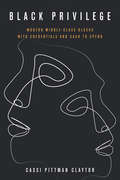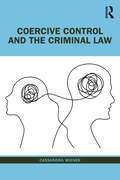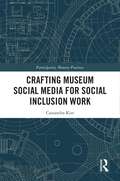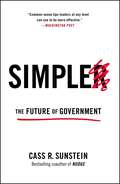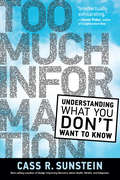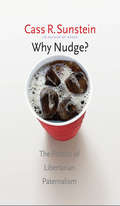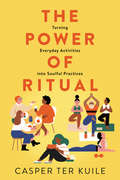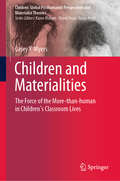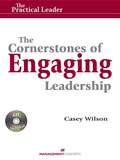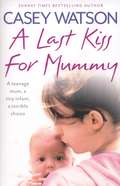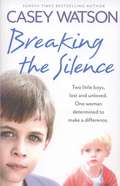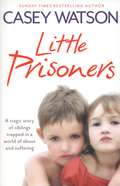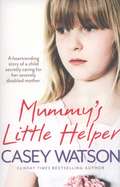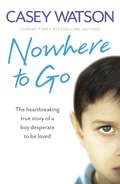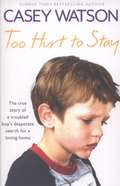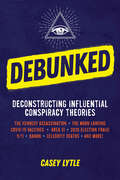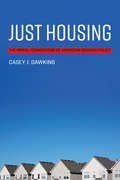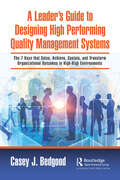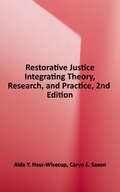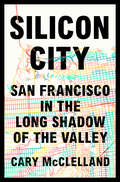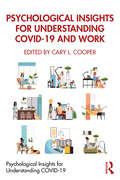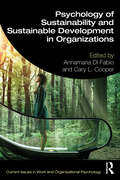- Table View
- List View
Black Privilege: Modern Middle-Class Blacks with Credentials and Cash to Spend (Culture and Economic Life)
by Cassi Pittman ClaytorIn their own words, the subjects of this book present a rich portrait of the modern black middle-class, examining how cultural consumption is a critical tool for enjoying material comforts as well as challenging racism. New York City has the largest population of black Americans out of any metropolitan area in the United States. It is home to a steadily rising number of socio-economically privileged blacks. In Black Privilege Cassi Pittman Claytor examines how this economically advantaged group experiences privilege, having credentials that grant them access to elite spaces and resources with which they can purchase luxuries, while still confronting persistent anti-black bias and racial stigma. Drawing on the everyday experiences of black middle-class individuals, Pittman Claytor offers vivid accounts of their consumer experiences and cultural flexibility in the places where they live, work, and play. Whether it is the majority white Wall Street firm where they're employed, or the majority black Baptist church where they worship, questions of class and racial identity are equally on their minds. They navigate divergent social worlds that demand, at times, middle-class sensibilities, pedigree, and cultural acumen; and at other times pride in and connection with other blacks. Rich qualitative data and original analysis help account for this special kind of privilege and the entitlements it affords—materially in terms of the things they consume, as well as symbolically, as they strive to be unapologetically black in a society where a racial consumer hierarchy prevails.
Coercive Control and the Criminal Law
by Cassandra WienerThis book considers how a phenomenon as complex as coercive control can be criminalised. The recognition and ensuing criminalisation of coercive control in the UK and Ireland has been the focus of considerable international attention. It has generated complex questions about the "best" way to criminalise domestic abuse. This work reviews recent domestic abuse criminal law reform in the UK and Ireland. In particular, it defines coercive control and explains why using traditional criminal law approaches to prosecute it does not work. Laws passed in England and Wales versus Scotland represent two different approaches to translating coercive control into a criminal offence. This volume explains how and why the jurisdictions have taken different approaches and examines the advantages and disadvantages of each. As jurisdictions around the world review what steps need to be taken to improve national criminal justice responses to domestic abuse, the question of what works, and why, at the intersection of domestic abuse and the criminal law has never been more important. As such, the book will be a vital resource for lawyers, policy-makers and activists with an interest in domestic abuse law reform.
Phantom Limb: Amputation, Embodiment, and Prosthetic Technology (Biopolitics #16)
by Cassandra S. CrawfordPhantom limb pain is one of the most intractable and merciless pains ever known—a pain that haunts appendages that do not physically exist, often persisting with uncanny realness long after fleshy limbs have been traumatically, surgically, or congenitally lost. The very existence and “naturalness” of this pain has been instrumental in modern science’s ability to create prosthetic technologies that many feel have transformative, self-actualizing, and even transcendent power. In Phantom Limb, Cassandra S. Crawford critically examines phantom limb pain and its relationship to prosthetic innovation, tracing the major shifts in knowledge of the causes and characteristics of the phenomenon. Crawford exposes how the meanings of phantom limb pain have been influenced by developments in prosthetic science and ideas about the extraordinary power of these technologies to liberate and fundamentally alter the human body, mind, and spirit. Through intensive observation at a prosthetic clinic, interviews with key researchers and clinicians, and an analysis of historical and contemporary psychological and medical literature, she examines the modernization of amputation and exposes how medical understanding about phantom limbs has changed from the late-19th to the early-21st century. Crawford interrogates the impact of advances in technology, medicine, psychology and neuroscience, as well as changes in the meaning of limb loss, popular representations of amputees, and corporeal ideology. Phantom Limb questions our most deeply held ideas of what is normal, natural, and even moral about the physical human body.
Crafting Museum Social Media for Social Inclusion Work (Participatory Memory Practices)
by Cassandra KistCrafting Museum Social Media for Social Inclusion Work investigates if and how social media can be integrated into the social inclusion initiatives of museums, and the contextual factors that impact this integration.Drawing on a year‑long case study of Glasgow Museums (Scotland), international mini case studies, and interviews with museum professionals, Kist reveals the complex social and technical negotiations that staff participate in to align social media practices with social inclusion work. Kist argues that the staff practices she observed around social media can be usefully understood through the idea of ‘craft’. This reframes staff practices for imagining future museum social media work as iterative, intuitive, and skilled balancing acts. As a craft, staff creatively draw on and work around social media affordances to balance the norms of their social inclusion work with the perceived interests and needs of users and community groups. Understanding the relation between museums’ use of social media and their ability to contribute to social inclusion initiatives is imperative, especially given the increasingly pervasive use of social media across the cultural heritage sector in recent years.Crafting Museum Social Media for Social Inclusion Work will be valuable for academics, practitioners, and students working in cultural heritage, museum studies, or social work.
Simpler
by Cass R. SunsteinSimpler government arrived four years ago. It helped put money in your pocket. It saved hours of your time. It improved your children's diet, lengthened your life span, and benefited businesses large and small. It did so by issuing fewer regulations, by insisting on smarter regulations, and by eliminating or improving old regulations. Cass R. Sunstein, as administrator of the most powerful White House office you've never heard of, oversaw it and explains how it works, why government will never be the same again (thank goodness), and what must happen in the future. Cutting-edge research in behavioral economics has influenced business and politics. Long at the forefront of that research, Sunstein, for three years President Obama's "regulatory czar" heading the White House Office of Information and Regulatory Affairs, oversaw a far-reaching restructuring of America's regulatory state. In this highly anticipated book, Sunstein pulls back the curtain to show what was done, why Americans are better off as a result, and what the future has in store. The evidence is all around you, and more is coming soon. Simplified mortgages and student loan applications. Scorecards for colleges and universities. Improved labeling of food and energy-efficient appliances and cars. Calories printed on chain restaurant menus. Healthier food in public schools. Backed by historic executive orders ensuring transparency and accountability, simpler government can be found in new initiatives that save money and time, improve health, and lengthen lives. Simpler: The Future of Government will transform what you think government can and should accomplish.
Too Much Information: Understanding What You Don't Want to Know
by Cass R. SunsteinThe bestselling author and recipient of the 2018 Holberg Prize, Cass R. Sunstein, explores how more information can make us happy or miserable, and why we sometimes avoid it--but sometimes seek it out.How much information is too much? Do we need to know how many calories are in the giant vat of popcorn that we bought on our way into the movie theater? Do we want to know if we are genetically predisposed to a certain disease? Can we do anything useful with next week's weather forecast for Paris if we are not in Paris? In Too Much Information, Cass Sunstein examines the effects of information on our lives. Policymakers emphasize "the right to know," but Sunstein takes a different perspective, arguing that the focus should be on human well-being and what information contributes to it. Government should require companies, employers, hospitals, and others to disclose information not because of a general "right to know" but when the information in question would significantly improve people's lives.
Why Nudge?
by Cass R. SunsteinBased on a series of pathbreaking lectures given at Yale University in 2012, this powerful, thought-provoking work by national best-selling author Cass R. Sunstein combines legal theory with behavioral economics to make a fresh argument about the legitimate scope of government, bearing on obesity, smoking, distracted driving, health care, food safety, and other highly volatile, high-profile public issues. Behavioral economists have established that people often make decisions that run counter to their best interests#151;producing what Sunstein describes as #147;behavioral market failures. ” Sometimes we disregard the long term; sometimes we are unrealistically optimistic; sometimes we do not see what is in front of us. With this evidence in mind, Sunstein argues for a new form of paternalism, one that protects people against serious errors but also recognizes the risk of government overreaching and usually preserves freedom of choice. Against those who reject paternalism of any kind, Sunstein shows that #147;choice architecture”#151;government-imposed structures that affect our choices#151;is inevitable, and hence that a form of paternalism cannot be avoided. He urges that there are profoundly moral reasons to ensure that choice architecture is helpful rather than harmful#151;and that it makes people’s lives better and longer.
The Power of Ritual: Turning Everyday Activities into Soulful Practices
by Casper ter KuileCasper ter Kuile, a Harvard Divinity School fellow and cohost of the popular Harry Potter and the Sacred Text podcast, explores how we can nourish our souls by transforming common, everyday practices—yoga, reading, walking the dog—into sacred rituals that can heal our crisis of social isolation and struggle to find purpose—a message we need more than ever for our spiritual and emotional well-being in the age of COVID-19.“After half a decade of research and hundreds of conversations with people around the country, I am convinced we are in the midst of a paradigm shift. That what used to hold us in community no longer works, and that the spiritual offerings of yesteryear no longer help us thrive.”–Casper ter KuileWhat do Soul Cycle, gratitude journals, and tech breaks have in common? For ter Kuile they offer rituals that create the foundation for our modern spiritual lives. We are in crisis today. Our modern technological society has left too many of us—no matter our ages—feeling isolated and bereft of purpose. Previous frameworks for building community and finding meaning no longer support us. Yet ter Kuile reveals a hopeful new message: we might not be religious, but that doesn’t mean we are any less spiritual. Instead, we are in the midst of a paradigm shift in which we seek belonging and meaning in secular practices. Today, we find connection in:CrossFit and SoulCycle, which offer a sense of belonging rooted in accountability and support much like church groupsHarry Potter and other beloved books that offer universal lessons Gratitude journals, which have replaced traditional prayer Tech breaks, which provide mindful moments of calm In The Power of Ritual, ter Kuile invites us to deepen these ordinary practices as intentional rituals that nurture connection and wellbeing. With wisdom and endearing wit, ter Kuile’s call for ritual is ultimately a call to heal our loss of connection to ourselves, to others, and to our spiritual identities.The Power of Ritual reminds us that what we already do every day matters—and has the potential to become a powerful experience of reflection, sanctuary, and meaning.
Children and Materialities: The Force of the More-than-human in Children’s Classroom Lives (Children: Global Posthumanist Perspectives and Materialist Theories)
by Casey Y. MyersThis book makes the case for young children as both keenly materially aware of and highly dependent on sets of interrelated material-discursive circumstances. It argues that long-term engagement with children around the topic of meaning-matter relations upends many taken-for-granted notions of consumption, self-regulation, knowledge production, and what constitutes quality of life within a school setting.The book provides complex accounts of agency on multiple scales - the capability of children to shape and share research, the force of objects, stuff, and things to impact the "social" workings of a classroom, and the impact of nonhuman animals on the trajectory of the ways in which children relate to each other.This work makes a significant contribution to both theoretical conceptions and practical enactments of childhoods, productively addressing the many contradictions inherent in a posthuman and participatory approach to researching with young children. It also offers insights into how the everyday materialities of children’s classrooms (and their complex representations) are capable of disrupting the common-sense order of things.
The Cornerstones of Engaging Leadership
by Casey WilsonIn the 21st Century, people are the competitive advantage. The talent and level of dedication of an organization's workforce make the difference in achieving success. The traditional command-oriented leadership style is not enough to keep today's employees motivated—they need to be engaged. They need passion, connection, and inspiration, and a willingness to put forth their best efforts to benefit themselves and their organization. The Cornerstones of Engaging Leadership connects what we know about engagement on an organizational level to what an individual leader can do to increase engagement. Using real-world examples, Wilson reveals the key actions leaders must take to connect with and engage others: •Build trust•Leverage unique motivators•Manage performance from a people-centric perspective•Engage emotions By committing to these four cornerstones of engaging leadership, leaders can unleash the potential of others and inspire effective performance. Through practice tools and exercises, readers are challenged to explore, reflect upon, and apply key concepts and techniques of the engaging leader approach.
A Last Kiss for Mummy: A Teenage Mum, A Tiny Infant, A Terrible Choice
by Casey WatsonAt fourteen, Emma is just a child herself - and one who's never been properly mothered. She has been in foster care several times already and when she discovered she was pregnant, and refused to have an abortion, her mother threw her out of the house. Casey and her family instantly form a strong bond with Emma's baby Roman, but dealing with Emma's behaviour and constant lack of responsibility is a far tougher challenge. And before long Casey finds she's doing something she never thought she would - covering up for Emma's shortcomings as she allows her personal involvement to colour her judgement. But the more Casey gets to know Emma the more she's convinced that with the right help and guidance this lonely and unsupported girl can become a good mother to her gorgeous little boy. That's what makes it even harder when Casey and her family have to make a stark choice: to hold on to Emma or look after Roman; to help a teenage girl desperate to turn her life around, or offer an innocent baby a safe home and much-needed good start in life.
Breaking the Silence
by Casey WatsonThis is the sixth title in the series. The Watsons are astonished when they answer their front door to find their case worker with a small boy on the doorstep. Jenson is just nine years old. He was removed from his home thirty minutes earlier when it was discovered his mother had left him at home while she went on holiday with her boyfriend. A couple of weeks later Casey is in for a second shock when she is asked to take a second nine-year-old boy, Georgie. Georgie is autistic and has been in a children’s home since he was a toddler. The home is closing and social services need somewhere temporary for him to stay. With her own grown up son, Kieron, having Asperger’s (a mild form of autism), Casey knows this is one child she cannot say no to. The relationship between Jenson and Georgie is difficult from the outset. Jenson is rebellious and full of attitude and he kicks off at anything, constantly winding Georgie up. Georgie doesn’t cope well with change and is soon in a permanent state of stress. Despite Casey’s best efforts, her innate love for the children is being tested and she begins to question if she can handle Jenson’s cruelty. But overtime it becomes clear that the boys have formed an unlikely bond. Could this be the solution to all of their troubles?
Little Prisoners: A Tragic Story of Siblings Trapped in a World of Abuse and Suffering
by Casey Watson<P>From the Sunday Times bestselling author comes a harrowing and moving memoir about two innocent and frightened unfosterable children who do not know what it means to be loved. This is the third book in the series. <P>The shock that strikes Casey and her family when Ashton and Olivia arrive is immeasurable. <P>Two dirty, frightened little waifs stand before them, huge eyes staring around their new surroundings. Ashton 9, Olivia 6, have the same urchin look; hair running wild with head lice, filthy nails and skin covered in scabs. And the smell is horrific. <P>The eldest two children of a group of five siblings, Casey had only been told they were coming two days earlier. But it was an emergency, temporary placement, and they were only due to stay a couple of weeks. <P> Casey is desperate to help these poor, lost children, who have been taken away from their family because they were considered at risk, but before she can even start to understand the horrific things that have happened in the past, she has to teach them the most basic of behaviours. <P> Ashton and Olivia have no barriers and no sense of what s right and wrong her challenges begin with the toilet and eating habits. The weeks roll into months and the months roll on, but bit by bit the children are starting to feel like they truly belong to a family, for the first time. <P>With this new found security and love, gradually they start to reveal what really happened to them and their siblings at home, and slowly Casey can help them start to rebuild their young lives. " <P><b>A New York Times Bestseller</b>
Mummy's Little Helper
by Casey WatsonThe fifth book from bestselling author and specialist foster carer Casey Watson. A recent census shows that there are at least 175,000 child carers in the UK, 13,000 of whom care for more than 50 hours a week. Many remain invisible to a system that would otherwise help them. Abigail is one of those children. This is her story. Ten-year-old Abigail has never known her father. Her mother, Sarah, has multiple sclerosis, and Abigail has been her carer since she was a toddler shopping, cooking, cleaning and attending to her personal needs. When Sarah is rushed to hospital, suddenly this comes to the attention of the social services, and Abigail has nowhere to go. Though she doesn't fit the usual profile of a child that specialist foster carers Casey and Mike Watson would take on, they are happy to step in and look after Abigail. It s an emergency, after all and all that s needed is a loving temporary home, while social services look into how to support the family so that they can be reunited. But it soon becomes clear that this isn't going to happen. Sarah s MS is now at a very advanced stage, and the doctors are certain that there will no longer be periods of remission. Abigail's emotional state starts to spiral out of control as she struggles to let go of the burden of responsibilities she has carried for so long. Sarah and Abigail insist that they do not need help, but with no other family to contact, social services are left with no choice but to find long-term care for Abigail, against their wishes. But Casey never gives up on a child in need, and she knows there must be another solution "
Nowhere to Go
by Casey WatsonFoster carer Casey Watson shares the shocking true story of Tyler, an abused eleven-year-old who, after stabbing his step-mother, had nowhere else to go.
The Silent Witness
by Casey Watson'I'm so sorry, Casey,' my link worker John said, sounding weary. 'I know this is probably the worst time I could ring you, but we desperately need someone to take a child tonight. ' It's the night before Christmas when Casey and Mike get the call. A twelve year old girl, stuck between a rock and a hard place. Her father is on a ventilator, fighting for his life, while her mother is currently on remand in prison. Despite claiming she attacked him in self-defence, she's been charged with his attempted murder. The girl is called Bella, and she's refusing to say anything. The trouble is that she is also the only witness. . .
Too Hurt to Stay: The True Story of a Troubled Boy's Desperate Search for a Loving Home
by Casey WatsonEight-year-old Spencer takes himself to social services and demands to be taken into care.Casey is determined to try and understand what Spencer is going through and help him find the loving home he is so desperately searching for.
Debunked EBK: Separate the Rational from the Irrational in Influential Conspiracy Theories
by Casey LytleHead down the rabbit hole and feed your fascination for conspiracy and controversy. Conspiracy theories-they're influential and spread to sometimes irrational extremes. Why do people cling to conspiracy theories so powerfully? Is there a way to separate the possible from the impossible? Yes. Enter: Debunked.Conspiracy theories pop up surrounding every major national and global event-some are possible, some are not. TikTok influencer and psychology professor Casey Lytle will teach you how to be an intelligent consumer of "alternative" theories. Lytle's trademark "project management approach" will help you discern possible from impossible in the popular and controversial theories surrounding 10 national and global events.9/11-No fewer than 10 alternative theories have gained traction. But let's evaluate: Did the Twin Towers really look like a controlled demolition? Would jet fuel have to melt steel for the towers to collapse? What would it take in hours and people to secretly plant enough explosives to bring the buildings down without being discovered, and without being set off by the impact and fires from the planes? All this and more in Chapter 7.COVID-19-The vaccine implants a microchip used to track people; the fatality rate has been wildly inflated; oh, and Bill Gates is not only responsible for the virus but also the head of a plot to use the virus as population control.School shooters-why are they so easy to explain, but so hard to predict? In what ways has the profile of a school shooter changed over the last 25 years, and what has caused those changes? Are school shootings a new phenomenon, or does the media simply make us more aware of them when they happen? The chapter will cover Sandy Hook conspiracy theories, as well as the psychology behind "truthers."
Just Housing: The Moral Foundations of American Housing Policy (Urban and Industrial Environments)
by Casey J. DawkinsA new conception of housing justice grounded in moral principles that appeal to the home&’s special connection to American life.In response to the twin crises of homelessness and housing insecurity, an emerging &“housing justice&” coalition argues that America&’s apparent inability to provide decent housing for all is a moral failing. Yet if housing is a right, as housing justice advocates contend, what is the content of that right? In a wide-ranging examination of these issues, Casey Dawkins chronicles the concept of housing justice, investigates the moral foundations of the US housing reform tradition, and proposes a new conception of housing justice that is grounded in moral principles that appeal to the home&’s special connection to American life. Dawkins examines the conceptual foundations of justice and explores the social meaning of the American home. He chronicles the evolution of American housing reform, showing how housing policy was pieced together from layers of housing and land-use policies enacted over time, and investigates the endurance—from the founding of the republic through the postwar era—of the owned single-family home as the embodiment of national values. Finally, Dawkins considers housing justice, drawing on elements of liberalism, republicanism, progressivism, and pragmatism to defend a right-based conception of housing justice grounded in the ideal of civil equality. Arguing that any defense of private property must appeal to the interests of those whose tenure is made insecure by the institution of private property, he proposes a &“secure tenure&” property regime and a &“negative housing tax&” that would fund a guaranteed housing allowance.
A Leader’s Guide to Designing High Performing Quality Management Systems: The 7 Keys that Solve, Achieve, Sustain, and Transform Organizational Outcomes in High-Risk Environments
by Casey J. BedgoodThe genesis of this book is over two decades of experience working with leaders who struggle with the concept of Quality Management System (QMS). Often, leaders fail to understand this concept, implement ineffective QMS models and subsequently are disrupted from their roles. More important and even more impactful are the consequences a poorly designed and executed QMS model has on organizational stakeholders including customers.The purpose of this book is to provide a simple leadership quick guide for designing high-performing Quality Management System models. This guide will focus on Quality Management System assessment, structure, process and achieving outcomes through practical real-world tools, templates, and models. The test of any model is its outcomes. This book will provide decades of insight so leaders ensure their QMS model Solves Problems, Achieves Outcomes, Sustains Wins, and Transforms Organizational Outcomes in High-Risk Environments.The intended audience for this book includes but is not limited to: top executives, governance members, leaders of any rank, thought leaders, strategists, students, performance improvement leaders, change agents, teachers, and anyone interested in quality, improvement, strategy, and leadership. Regardless of role, organization type, or industry, quality matters and is a focal point for customers. Thus, those leading the charge for excellence in this arena must have a good structure, process, and measurable outcomes sustained over time.So, why is this topic important? In today’s world, change is the new normal and only constant. In many industries, such as healthcare for example, the foundations of the industries themselves are shaking greater than at any other time in history. As change grows, so does the associated risk and disruption. How will leaders and their organizations succeed in high-risk environments without a good foundation? The short answer is they won’t. The starting point for success is the Quality Management System.By reading this book, readers will learn: How to construct a well-defined Quality Management System (QMS) How to identify and counter common misperceptions of QMS Techniques to engage other leaders in crucial conversations related to QMS gaps, illusions of success, perceived and real shortcomings, and measures of success How to conduct a basic and advanced assessment of Quality Management System models to determine what is working, what is not working, and high-risk areas to improve The required structural elements of high-performing QMS models A wholistic approach to the QMS process What measures constitute QMS success
Restorative Justice: Integrating Theory, Research, and Practice
by Aida Y. Hass-Wisecup Caryn E. SaxonThis book provides students, practitioners, and criminal justice professionals with a comprehensive introduction to restorative justice that combines theoretical foundations, guiding principles, empirical evidence, and real-world implementations of various restorative processes and practices. Through easy-to-navigate chapters, the authors present readers with information concerning how and why restorative practices are implemented within communities in order to expand and enhance conventional approaches to crime prevention, community building, and criminal justice. Though designed for the college classroom, this text is an ideal and accessible introduction for anyone interested in exploring the philosophy, evaluation, and application of restorative justice. In the second edition, the authors have added new boxed features, updated the text to reflect current information and statistics, and expanded chapters relevant to the implementation of restorative practices in justice systems, processes, and movements.
Silicon City: San Francisco In The Long Shadow Of The Valley
by Cary McClellandAn intimate, eye-opening portrait of San Francisco transformed by the tech boom. San Francisco is changing at warp speed. Famously home to artists and activists, and known as the birthplace of the Beats, the Black Panthers, and the LGBTQ movement, in recent decades the Bay Area has been reshaped by Silicon Valley, the engine of the new American economy. The richer the region gets, the more unequal and less diverse it becomes, and cracks in the city’s facade—rapid gentrification, an epidemic of evictions, rising crime, atrophied public institutions—have started to show. Inspired by Studs Terkel’s classic works of oral history, writer and filmmaker Cary McClelland spent several years interviewing people at the epicenter of the recent change, from venture capitalists and coders to politicians and protesters, from native sons and daughters to the city’s newest arrivals. The crisp and vivid stories of Silicon City’s diverse cast capture San Francisco as never before. The book opens with a longtime tour guide recounting the history of the original Gold Rush and observing how little the people of his city pay attention to its history; it ends on Fisherman’s Wharf, with the proprietor of an arcade game museum reminding us that even today’s technology will become relics of the past. In between we hear from people who have passed through Apple, Google, eBay, Intel, and the other big tech companies of our time. And we meet those who are experiencing the changes at the grassroots level: a homeless advocate in Haight-Ashbury, an Oakland rapper, a pawnbroker in the Mission, a man who helped dismantle and rebuild the Bay Bridge, and a woman who runs a tattoo parlor in the Castro. Silicon City masterfully weaves together a candid conversation across a divided community to create a dynamic portrait of a beloved city—and a cautionary tale for the entire country.
From Stress to Wellbeing Volume 2
by Cary L. CooperA comprehensive collection by Professor Cary Cooper and his colleagues in the field of workplace stress and wellbeing, which draws on research in a number of areas including stress-strain relationships, sources of workplace stress and stressful occupations. Volume 2 of 2.
Psychological Insights for Understanding COVID-19 and Work (Psychological Insights for Understanding COVID-19)
by Cary L. CooperIn the Psychological Insights for Understanding COVID-19 series, international experts introduce important themes in psychological science that engage with people’s unprecedented experience of the pandemic, drawing together chapters as they originally appeared before COVID-19 descended on the world. This timely and accessible book brings together a selection of chapters offering insights into issues surrounding work and the COVID-19 pandemic. Featuring content on topics such as health and wellbeing, work-family, flexible hours, organisational communication, talent management, recovery from work, employee engagement and flourishing, burnout, and organisational interventions, the book includes a specially written introduction contextualising the chapters in relation to the COVID-19 crisis. Reflecting on how psychological research is relevant during a significant global event, the introduction examines the potential future impact of the pandemic on the practice and study of psychology and our lives more generally. Featuring theory and research on key topics germane to the global pandemic, the Psychological Insights for Understanding COVID-19 series offers thought-provoking reading for professionals, students, academics and policy makers concerned with the psychological consequences of COVID-19 for individuals, families and society.
Psychology of Sustainability and Sustainable Development in Organizations
by Cary L. Cooper Annamaria Di FabioThis volume answers calls for improving sustainability and sustainable development in organizations from a psychological point of view. It offers a range of perspectives on the current research in the psychology of sustainability and sustainable development to highlight effective ways of improving well-being and healthy sustainable development in organizations. Section 1 introduces the concept of the psychology of sustainability and sustainable development as well as macro topics of related issues in organizations. Section 2 focuses on themes traditionally recognized in organizational psychology literature, such as performance, negotiation, leadership, resistance to change, innovation, and digital transformation. Section 3 presents variables to enhance sustainability and sustainable development in organizations and considers levels of prevention. Topics include humor awareness as a primary prevention resource in organizations, intrapreneurial self-capital as an individual preventative strength, compassion within organizations, perfectionism as an inhibitor in organizational contexts, and job crafting from individual to collaborative to organizational, meaningfulness and sustainable careers. With a clear psychological focus on the topic of leading sustainability efforts, this book will be of great interest to students and academics who want to learn more about corporate sustainability. It is also a useful resource for business executives, team leaders and managers.
